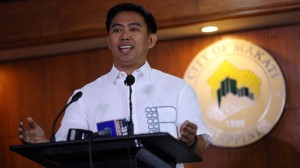BAGUIO CITY—For one justice, the challenge in the case before the Supreme Court lies in its political character.
Associate Justice Marvic Leonen noted the difficulty in the Ombudsman’s case seeking to stop Makati Mayor Junjun Binay’s petition against his suspension—a case that will have the magistrates weighing the questions of the state’s power to investigate officials, the judiciary’s power to restrict such authority, and the rights of those in elective posts.
“It is a difficult case not only because it is complex, but also because it is political,” said Leonen during his turn to question Solicitor General Florin Hilbay during oral arguments on the case on Tuesday.
Arguing that its investigative mandate protected it against court injunctions, the Ombudsman sought a remedy from the Supreme Court through a certiorari petition to stop Binay’s own certiorari plea against his suspension before the Court of Appeals.
It cited Section 14 of the Ombudsman Act, which says “no writ of injunction shall be issued by any court to delay an investigation being conducted by the Ombudsman under this Act, unless there is a prima facie evidence that the subject matter of the investigation is outside the jurisdiction of the Office of the Ombudsman.”
The Ombudsman had suspended Binay for six months pending its investigation of the mayor’s alleged involvement in the reportedly overpriced contract to build the P2.3-billion Makati City Hall Building II.
The appellate court issued a writ of preliminary injunction in Binay’s favor on April 6, indefinitely extending the 60-day temporary restraining order it issued in March until it has ruled with finality over Binay’s certiorari plea.
During the oral arguments, Ombudsman Conchita Carpio Morales asserted her power to suspend Binay and the necessity of such preventive action for her office to pursue its investigation.
The Binay camp has, meanwhile, repeatedly asserted that charges against the mayor, as well as separate allegations of corrupt practices against his father, Vice President Jejomar Binay, were politically motivated as part of the efforts to smear the Binay name before the 2016 elections.
The elder Binay is seeking to run for president next year.
In his interpellation, Leonen cited how the law gave the Ombudsman the extent of its authority considering the challenging campaign to stamp out corruption. “The difficulty of fighting corruption is precisely why it has been given extraordinary powers,” he said.



